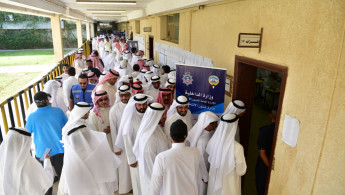Kuwaitis elect new parliament in hope of ending stalemate
Polls opened on Tuesday in Kuwait's seventh general election in just over a decade, following repeated political crises that have undermined parliament and stalled reforms.
More than 793,000 eligible voters will have the chance to determine the make-up of the 50-seat legislature in the only Gulf Arab state to have an elected parliament with powers to hold government to account.
Polling stations opened at 8:00 am (0500 GMT) and are due to close at 8:00 pm, with the results to be announced the following day.
Voters queued outside in the sweltering summer heat, many of them dressed in traditional thob gowns.
"I came to perform my patriotic duty and I am hopeful that things will get better," Maasoumah Bousafar, 64 told AFP after casting her ballot.
Kuwait's emir, Nawaf al-Ahmad Al-Sabah, called the vote last month after he had again dissolved parliament amid a persistent deadlock with the executive branch that has deterred investment and impeded growth.
A total of 207 candidates are running for a four-year term as lawmakers, the lowest number in a general election since 1996. They include opposition figures and 13 women.
All but three of the 50 members of parliament who won in 2022 are seeking re-election.
Despite widespread frustration with the political elite, human rights activist Hadeel Buqrais said it was still important to cast a ballot.
"This is the only place where I have a voice, and boycotting means giving up my right as a citizen," she told AFP.
"I have to participate, even if I do not expect the new parliament to tackle issues" concerning the country's human rights record, Buqrais said.
Since Kuwait adopted a parliamentary system in 1962, the legislature has been dissolved around a dozen times.
In March, the constitutional court annulled the results of last year's elections - in which the opposition made significant gains - and reinstated the previous parliament elected in 2020.
"Many in Kuwait do feel as if they are being asked to participate in a political process that does not serve them," said Daniel L. Tavana, Assistant Professor of Political Science at Penn State University.
"This is because the electoral system is broken" he told AFP, arguing that "there are limits to what we can expect an elected legislature to do".
While lawmakers are elected, Kuwait's cabinet ministers are installed by the ruling Al-Sabah family, which maintains a strong grip over political life.
Great turnout by Kuwaiti elderly to cast their vote for elections https://t.co/IhuYwavS6G#KUNA #KUWAIT pic.twitter.com/NqUAaKZDaf
— Kuwait News Agency - English Feed (@kuna_en) June 6, 2023
Continual standoffs between the branches of government have prevented lawmakers from passing economic reforms, while repeated budget deficits and low foreign investment have added to an air of gloom.
Oil-rich Kuwait, which borders Saudi Arabia and Iraq, boasts seven percent of global crude reserves. It has little debt and one of the strongest sovereign wealth funds in the world.
But its lack of stability has scared off investors and dashed hopes of reform in a wealthy country struggling to diversify in similar ways to Gulf powerhouse Saudi Arabia, Qatar and the United Arab Emirates.
"Kuwait is not doing well," said Bader al-Saif, assistant professor of history at Kuwait University. "Elections on steroids... are not the only solution.
"The Kuwaiti political system is in dire need for innovation," he told AFP, criticising a "failure in leadership in Kuwait's often recycled political class, whether in government or parliament".





 Follow the Middle East's top stories in English at The New Arab on Google News
Follow the Middle East's top stories in English at The New Arab on Google News


